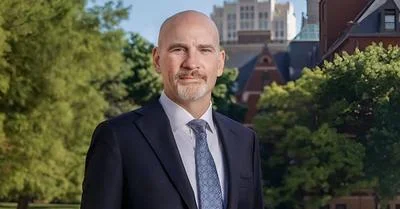Adam Kautzner, president, Express Scripts, Inc., and Lina Kahn, chair, Federal Trade Commission | LinkedIn / FTC.gov
Adam Kautzner, president, Express Scripts, Inc., and Lina Kahn, chair, Federal Trade Commission | LinkedIn / FTC.gov
The Federal Trade Commission (FTC) released a report this week that FTC Chair Lina Kahn said shows that three pharmacy benefit managers (PBMs) — including St. Louis-based Express Scripts, Inc. — have “hiked costs” for a range of prescription medications.
"This report finds that three major pharmacy benefit managers hiked costs for a wide range of lifesaving drugs, including medications to treat heart disease and cancer,” said Kahn in a press release. “We will continue our work to shed light on these practices and their impact on Americans who depend on affordable medications.”
The report is the second interim release in a study launched by the FTC in June 2022. It focuses on the role of PBMs in shaping drug pricing and access to prescription medications.
A PBM is a third-party administrator of prescription drug programs for health insurers, self-insured employers, and government agencies. PBMs negotiate with drug manufacturers to secure discounts and rebates on medications, manage pharmacy networks, and process prescription drug claims. PBMs also provide services such as medication therapy management and mail-order pharmacy services.
“The ‘Big 3 PBMs’—Caremark Rx, LLC (CVS), Express Scripts, Inc. (ESI), and OptumRx, Inc. (OptumRx)—marked up numerous specialty generic drugs dispensed at their affiliated pharmacies by thousands of percent, and many others by hundreds of percent,” said the FTC’s press release. “Such significant markups allowed the Big 3 PBMs and their affiliated specialty pharmacies to generate more than $7.3 billion in revenue from dispensing drugs in excess of the drugs’ estimated acquisition costs from 2017-2022.”
Founded in 1986, Express Scripts, is headquartered at 1 Express Way in St. Louis. Adam Kautzner, PharmD, is president of the company, which is a subsidiary of The Cigna Group's Evernorth Health Services.
One practice identified in the FTC report is spread pricing, where PBMs charge health plans a higher price for a drug than they reimburse to pharmacies, keeping the difference as profit. This practice can result in increased costs for payers and patients, said the FTC report, while limiting the revenue for pharmacies.
The report also said rebate agreements between PBMs and drug manufacturers incentivize higher list prices for medications.
PBM fees and reimbursement rates, said the report, also threaten the financial stability of small pharmacies, reducing patient access to local providers of essential medications. Patients in these areas often face higher out-of-pocket costs and fewer options for obtaining the medications they need.
The agency said it will use the report findings to develop policy recommendations and enforcement measures.. Public comments on the report are encouraged and will inform the FTC’s ongoing efforts to evaluate the broader impact of PBM practices on drug prices and access.




 Alerts Sign-up
Alerts Sign-up